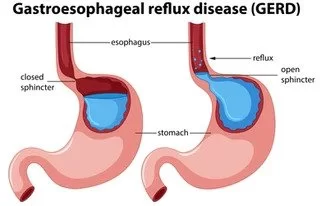
Has this happened to you?
You wake up in the morning with a sore throat more often than not.
You feel discomfort after eating a large meal.
You have regular feeling of heartburns and certain foods trigger regurgitative burps causing burning sensations in your throat.
If you experience these events frequently, it may be a good idea to get yourself checked by a gastroenterologist for possible GERD (Gastroesophageal Reflux Disease).
What is GERD?
At the base of our esophagus and the top of our stomach is a small muscle called the sphincter muscle. The purpose of this muscle is to ensure that the food we consume goes into the stomach and stays there, not coming back into the esophagus.
Certain foods, medications, alcohol and sometimes congenital disorders make this muscle weak or loose, resulting in stomach acids rising into the esophagus and causing reflux (which may result in vomiting, particularly in younger children) and very commonly, acidity (a term widely used for acid reflux).
Regular reflux occurrence can cause a host of health issues, including
- Nausea
- Bad breath
- Trouble breathing
- A hard time swallowing
- Vomiting
- Wearing away of tooth enamel
- A lump in your throat
- A lingering cough
- Laryngitis
- Asthma that comes on suddenly or gets worse
- Sleep problems
How Can Diet Help
Our bodies love balance. That includes a balanced pH level in our body. Water is regarded as pH neutral with a pH of 7. Lower than 7 is considered acidic, higher than 7 is considered alkaline. Our stomach pH is between 1 to 4, which is naturally acidic as the gastric juices need to digest the food we have consumed and break it down to absorbable nutrients.
So if stomach is naturally acidic and acid in esophagus is bad, we must try and keep it in the stomach right?
That is correct.
Research is ongoing and more research will bring about more data, but currently from some small studies it is suggested that a diet that focuses on alkaline foods and avoids foods that are acid producing or have a sphincter relaxing effect reduces symptoms of GERD and helps in managing the disease.
Foods to avoid
There will be a lot of disappointed readers after reading this list, I can fully understand why. But the tradeoff to avoiding these foods may be better sleep, less instances of heartburn and overall improvement in heath.
- Chocolate and mint: Why? These two actually relax a muscle at the base of the esophagus (the esophageal sphincter to be exact). Once relaxed, this allows stomach acid to wash up the esophagus, which irritates the voice box.
- Alcohol, coffee, caffeine and hot spices: I love a good cup of coffee and spicy food, but these items increase your stomach’s acidity so much that it escapes up the esophagus. Alcohol is a natural relaxant and hence relaxes the sphincter muscle too. If you are suspecting you may have GERD, best to avoid these for a while and observe if the symptoms ease up.
- Fried food, processed and fatty meat and dairy: Fried food has never been good for us, meat doesn’t need to be processed and eating leaner cuts just makes sense for so many reasons. Cheese, as delicious as it is, is clearly not health food. So, all of these were no-brainers.
Foods to have
I would like to point out that every body is different and though some may find this way of eating very beneficial, it may not change much for some. I highly encourage anyone trying to manage GERD to always follow your physician’s advice and seek professional guidance when in doubt.
- Milk: Non-dairy milk such as coconut milk, soy milk, cashew milk, almond milk, etc.
- Protein: Plant protein whenever possible and lean cuts of meat that are not breaded
- Grains: Whole grains
- Vegetables: Pretty much everything, as fresh as possible, preferably raw and never fried; leafy greens like spinach and kale are especially good, as are broccoli and cauliflower, avocado, cucumber and mushrooms.
- Fruit: Pome fruit (apples, pears), tropical fruit (except pineapple), berries, melons and bananas
- Fats: Plant fat likes olive oil, coconut oil and fats from fish
- Beverages: Water, juice (that is just juice) and herbal tea.
In addition to this:
- Avoid smoking
- Get to a healthier weight, if currently overweight
- Wear proper fitting clothes, not too tight, especially around the waist
- Avoid over eating
- Do not eat too close to bed time, keep a gap of at least 3 hours from last meal to sleeping
- Eat slowly and chew your food thoroughly
Most GERD symptoms can be managed through lifestyle interventions, however some serious cases may require medical intervention, including certain anti acid medications and in very severe cases surgical options may be suggested.
As always, the world of nutrition and its benefits/impact is being researched at a rampant pace and new research brings about new insights. If have a concern about what condition is bothering you, I recommend seeking professional guidance.
Till next time,
Stay Healthy
Stay Happy
Mitun De Sarkar – Best Dietitian in Dubai







